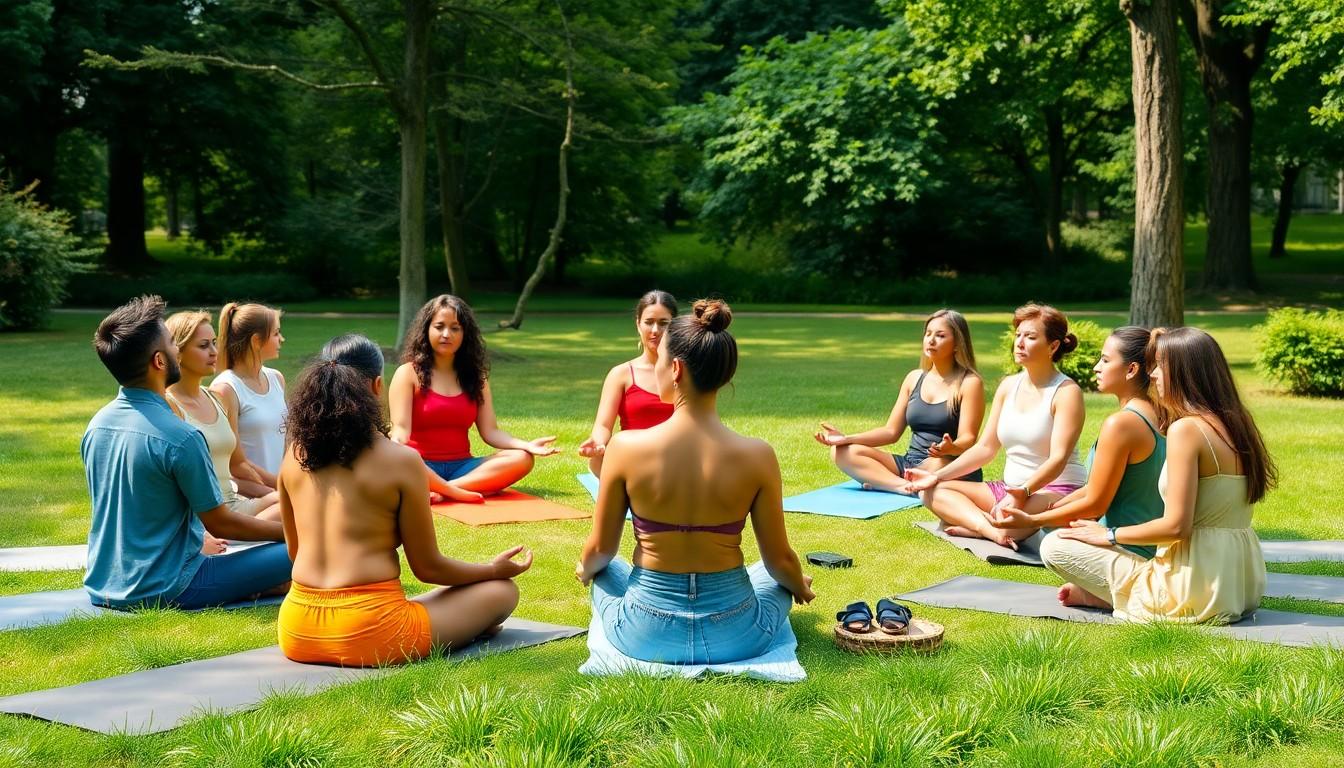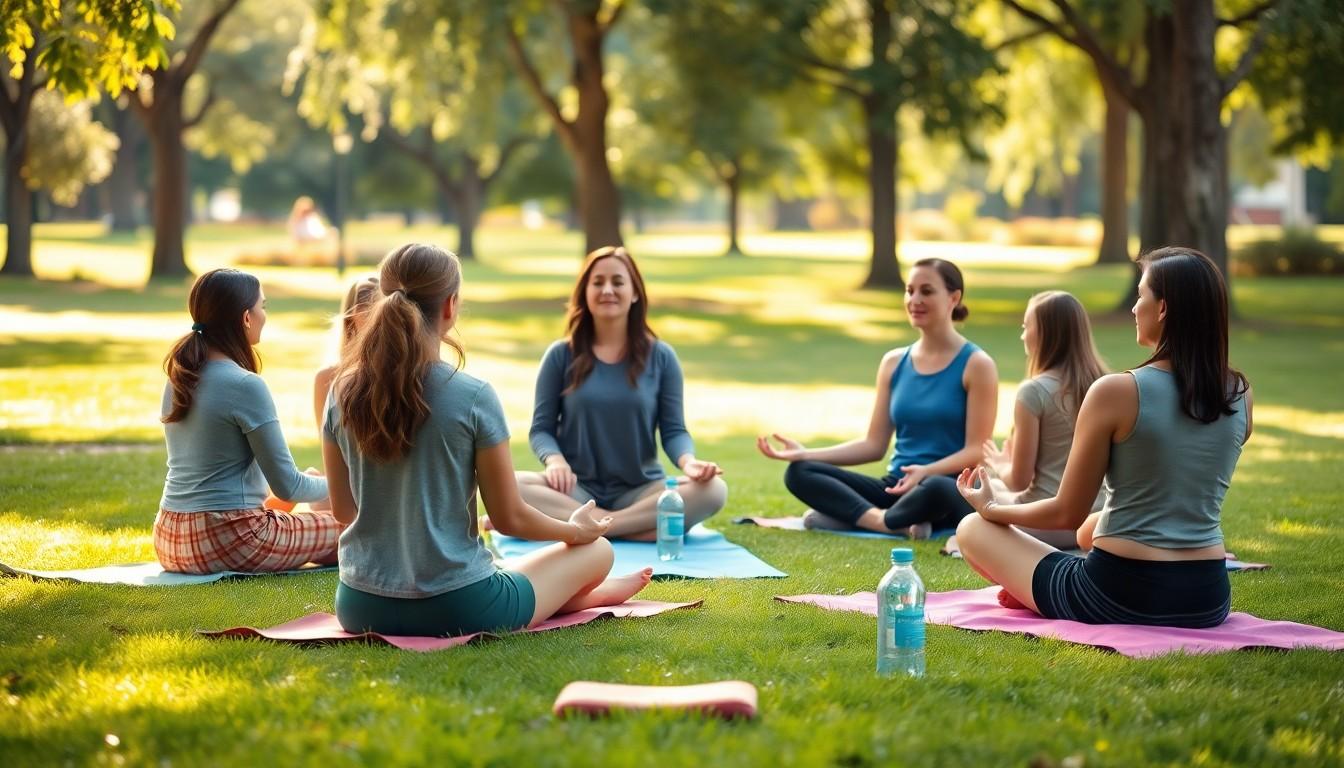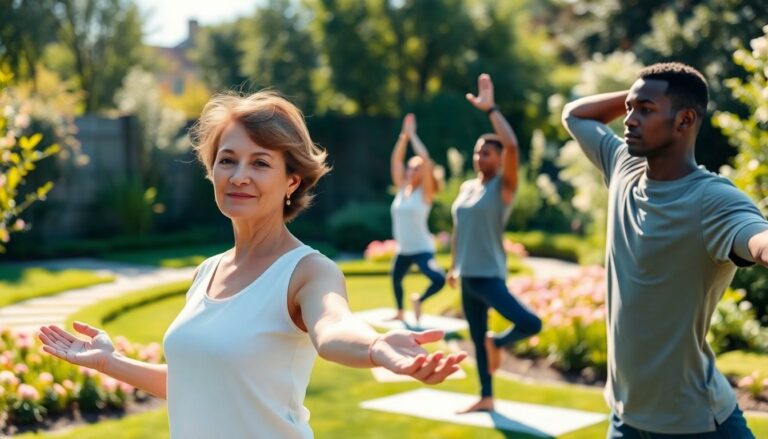In a world buzzing with distractions and endless to-do lists, finding peace can feel like searching for a needle in a haystack. Enter the mindful living group—a sanctuary for those who want to swap chaos for calm. Imagine gathering with like-minded souls, sipping herbal tea, and discovering the art of being present. Sounds dreamy, right?
But it’s not just about the zen vibes; it’s about embracing a lifestyle that helps reduce stress and boosts happiness. Whether you’re a seasoned yogi or someone who thinks “mindfulness” is just a fancy word for napping, this group welcomes everyone. So why not take a break from scrolling and start scrolling inward? Join the mindful living group and unlock the secrets to a more balanced, joyful life. After all, who wouldn’t want to be the calm in the storm?
Mindful Living Group
A mindful living group serves as a supportive community that fosters mindfulness and well-being. Participants engage in various activities designed to cultivate awareness and reduce stress. Typically, these groups provide guided meditation sessions, mindful exercises, and discussions on living in the present moment.
Members come together to share experiences, insights, and techniques concerning mindfulness practices. This collective approach enhances individual journeys toward inner peace. The inclusive nature of these groups welcomes individuals from diverse backgrounds, whether experienced or brand new to mindfulness.
In a mindful living group, practices often include yoga, breathwork, and reflective journaling. Each session aims to build connection, promote empathy, and enhance emotional resilience. Conversations within the group center on recognizing thoughts and feelings without judgment.
Tranquility becomes a focal point as individuals strive to minimize distractions from daily life. Regular participation can lead to increased happiness and reduced anxiety. Many participants find that mindfulness not only benefits their mental health but also fosters healthier relationships with themselves and others.
Overall, a mindful living group offers a structured environment for deepening understanding and practicing mindfulness. Community connections, shared goals, and collective support enhance the experience, making it an enriching choice for those seeking holistic well-being.
Benefits of Joining a Mindful Living Group

Joining a mindful living group offers numerous advantages for those seeking deeper well-being and community. Participants experience enhanced emotional health and robust support from like-minded individuals.
Emotional Well-Being
Emotional well-being improves through regular practice in a mindful living group. Participants often report decreased stress levels after engaging in mindfulness activities. Increased self-awareness leads to better emotion regulation and a more positive outlook on life. Considerable evidence suggests that mindfulness practices, such as meditation and breathwork, significantly reduce anxiety symptoms. Collectively, these experiences foster greater resilience against daily stressors, enabling individuals to navigate life’s challenges with more ease. Building connections with others who share similar goals promotes an atmosphere of encouragement that further enhances emotional stability.
Community Support
Community support plays a crucial role in the benefits of a mindful living group. Individuals gain access to a network of peers, fostering a sense of belonging. Sharing personal experiences among participants encourages openness and provides new perspectives on mindfulness practices. Being part of a supportive community strengthens motivation to maintain a consistent mindfulness routine. Members often uplift each other during challenging times and celebrate successes together. Inclusive group dynamics create a safe environment for individual growth and exploration, allowing everyone to thrive on their mindfulness journey.
Activities and Practices
Mindful living groups offer a variety of activities designed to enhance awareness and foster community. Participants engage in practices that promote inner peace and emotional resilience.
Guided Meditations
Guided meditations form a core part of the mindful living experience. These sessions provide structure and support, allowing participants to focus their attention inward. Instructors lead the group through relaxation techniques, encouraging deep breathing and visualization. Such sessions often vary in length, ranging from 20 minutes to an hour. Participants frequently report reduced stress and enhanced mindfulness after each session. Accessing inner calm becomes easier, contributing to an overall sense of well-being.
Group Discussions
Group discussions play a vital role in sharing experiences and insights. Members gather to explore challenges and successes related to mindfulness practices. Conversations often delve into various themes, including emotional health and personal growth. Active participation fosters a sense of belonging and connection among members. Listening to diverse perspectives can inspire personal reflection and deeper understanding. Engaging in these discussions enhances emotional intelligence and supports ongoing journeys toward mindfulness.
Workshops and Retreats
Workshops and retreats provide immersive experiences for deeper exploration. Structured programs focus on specific aspects of mindfulness, such as breathwork and movement. These events often span several hours to several days, offering ample time for participants to engage with one another. Surrounded by nature during retreats, individuals can foster connection with themselves and each other. Participants frequently return energized, equipped with new skills and insights. Such gatherings cultivate a strong sense of community and support within the group.
How to Find the Right Mindful Living Group
Choosing the right mindful living group involves understanding personal needs and preferences. Following steps can streamline the selection process.
Consider Your Goals
Identifying personal goals is crucial. Whether seeking stress relief, improved emotional health, or enhanced mindfulness, clarity guides the search. Explore groups that align with those aims. Seeking specific practices like meditation or yoga influences decisions too. Some may prioritize community support, while others focus on individual development. Setting clear objectives helps narrow options effectively.
Assess the Group’s Values
Evaluating a group’s values plays a key role in compatibility. Members should share similar beliefs about mindfulness and personal growth. Researching the group’s mission statement offers insights into their philosophy. Participation styles matter as well; some groups emphasize structured activities, while others adopt a more relaxed approach. Observing group dynamics during initial visits can reveal alignment with personal values. Compatibility enhances the overall experience, fostering deeper connections among participants.
Peace and Emotional Well-being
Joining a mindful living group can significantly enrich one’s journey toward inner peace and emotional well-being. These communities provide invaluable support and a sense of belonging that enhances mindfulness practices. Through shared experiences and activities, members cultivate deeper connections and resilience against life’s challenges.
As individuals explore their personal paths to mindfulness, the encouragement and insights gained from fellow participants can be transformative. Embracing the principles of mindful living within a group setting not only fosters personal growth but also contributes to a more balanced and joyful life. Engaging with like-minded individuals can lead to lasting changes that resonate far beyond the group experience.




